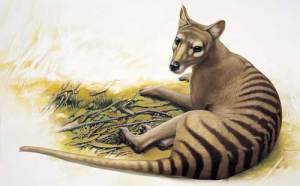 As CB readers know, I’m in Brisbane this week for the 10th International Congress of Ecology (INTECOL). My last post was on a great plenary talk by biodiversity guru, Kevin Gaston of the University of Sheffield, and I’ve got one more before heading back to Adelaide tomorrow.
As CB readers know, I’m in Brisbane this week for the 10th International Congress of Ecology (INTECOL). My last post was on a great plenary talk by biodiversity guru, Kevin Gaston of the University of Sheffield, and I’ve got one more before heading back to Adelaide tomorrow.
Today, the last day of INTECOL talks, brought together some great conservation minds in a session in which I was honoured to participate. I spoke on extinction synergies, but I think John Woinarski of the Northern Territory Government stole the show.
I used to live in the NT and have seen John speak many times; however, this was one of the best and most sobering of his talks I’ve seen yet.
In a nutshell, we are STILL experiencing a colossal decline in our mammals. I think many might know that Australia is the WORST country in the world for mammal extinctions already – even more gut-wrenching when you consider that our closest competitors are small islands that have a completely different set of threats. However, many don’t know (and this is John’s point), that we are still losing populations at an outrageous rate.
John’s been working on everything from Conilurus to quolls in the central and northern parts of Australia for over 20 years, and he’s got some of the best data around. Without fail, almost every remaining native small mammal population is in decline, even to the point of local extirpation in over 50 % of all his monitoring sites (and there are a lot of monitoring sites).
If that isn’t worrying enough, much of his data are collected in some of our biggest national parks (e.g., Kakadu National Park) – this basically means that despite restricting habitat loss (our greatest driver of extinction), mammal populations are still in ever-increasing states of buggery.
So, what are the causes? Anyone who’s been to Kakadu National Park, or (even luckier) has been to Arnhem Land, know that we’re literally burning the shit out of these places. Sure, fire is an integral part of northern Australian ecology, but the pervasive paradigm – unless-it’s-burnt-every-year-it’s-bad credence – means that nothing ever has a chance to come back after a population crash caused by a one-off fire.
Sure, things like cane toads and other feral animals might play a role, but it’s the ridiculous burning regime we’ve adopted that’s destroying our already depleted and unique mammalian species assemblage. Unless we reverse this trend NOW, we’ll have more or less condemned our one-of-a-kind mammals to extinction. As an Australian, can you live with that?
A stark reminder of how ridiculous the situation has become, esteemed Professor William Bond of South Africa stated in the question period after John’s talk (I paraphrase):
“When you arrive in Australia, you are bombarded with slogans of sporting victories, great food and fantastic wine [all true], but no one tells you of the biodiversity tragedy that has, and is continuing, to happen in Australia. In Africa, we have managed to convince people to conserve elephants that destroy their crops and kill their families – why can’t Australians realise their are destroying their very heritage? What are you doing to stop the carnage?”
I have no answer. Sorry, William. Sorry, John. Sorry, Australia.













[…] has been relatively light compared to the south, native animals are on the decline in part from introduced species. And guess what? We are no closer to controlling them now than anytime in our […]
LikeLike
[…] and one of Australia’s more notable biodiversity embarrassments over the last year (see Shocking continued loss of Australian mammals and Can we solve Australia’s mammal extinction crisis?), and now the most empirical demonstration […]
LikeLike
[…] Shocking continued loss of Australian mammals « ConservationBytes.com conservationbytes.com/2009/08/21/shocking-continued-loss-of-australian-mammals – view page – cached #RSS 2.0 ConservationBytes.com » Shocking continued loss of Australian mammals Comments Feed ConservationBytes.com Conservation that bites The rarity of commonness — From the page […]
LikeLike
[…] https://conservationbytes.com/2009/08/21/shocking-continued-loss-of-australian-mammals/ […]
LikeLike